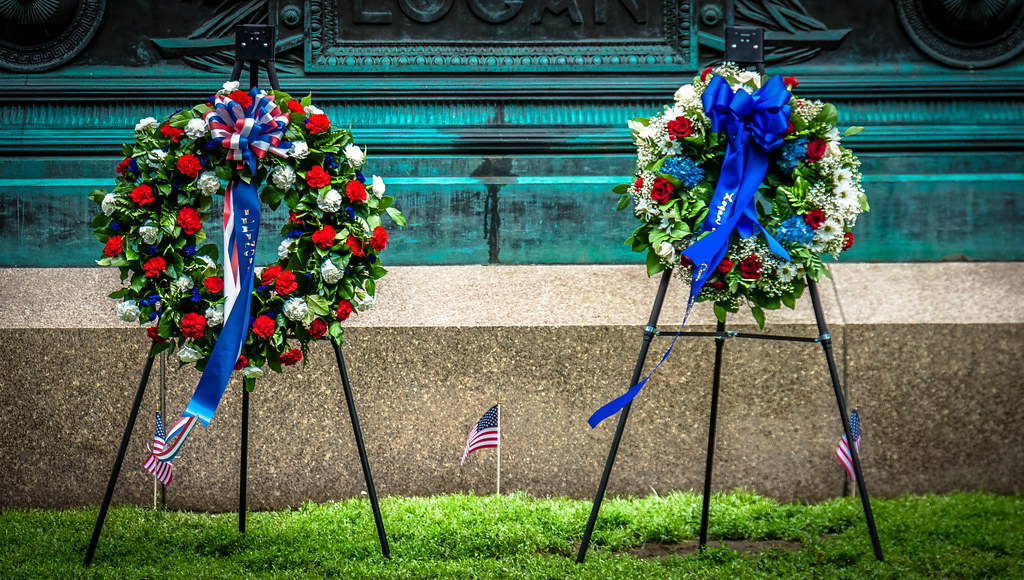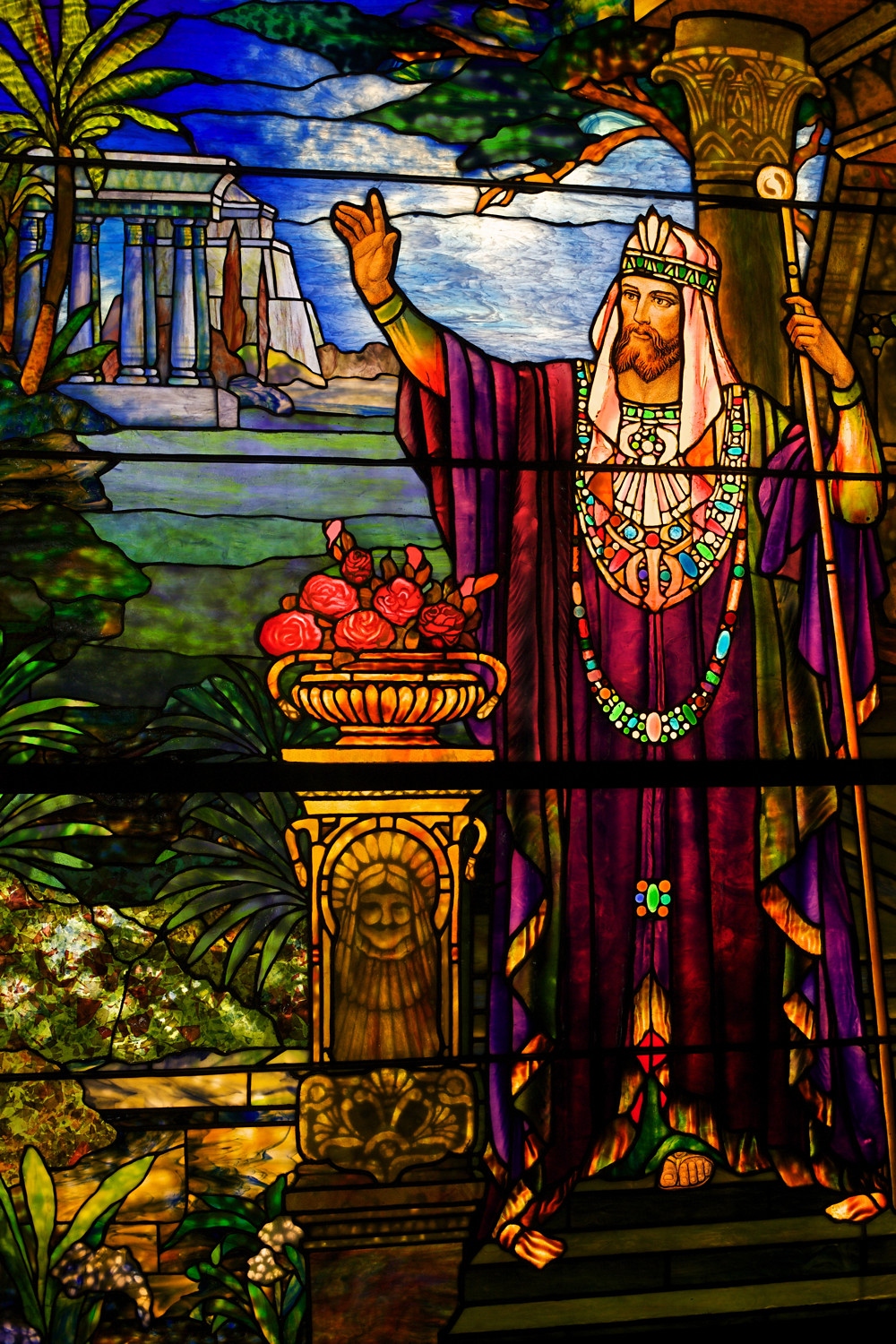|
Tomorrow, we celebrate a day called "Memorial Day." The end of the Civil War, in 1865, was the impetus for the establishment of the country's first national cemetery. Also, John A. Logan, who was the leader of the Northern Civil War Veterans called for a day to commemorate the sacrifices of the veterans of the Civil War. This holiday evolved as one to remember all American service people who died in any military conflict. Originally known as Decoration Day, it became an official federal holiday in 1971.
It is because we want to honor, respect, and recognize our soldiers that we remember them. Because of their sacrifices we live in a land of freedom. We cannot take these freedoms for granted. We must recall the reasons for their sacrifices and live God-honoring lives. Our history is rich with stories of how God established our ancestors to be shining lights for Him. He knows how important it is for us to recount the times when He showed His mighty hand on our behalf. Over 200 times the Bible uses the word "remember." The Lord does not want us to forget the way He cared for our forefathers or the covenant that He made with them. Generations later God still keeps His covenant and tells us to remember. In Exodus 6:5 God assures the Israelites that He remembers the covenant He made with them. This remembrance brought Him to lead the Israelites out of bondage. They saw many signs and wonders including the opening of the Red Sea so that they could walk to the other side, the drowning of the Egyptians who pursued them, and the provision of water, bread, and quail in the wilderness. It was so important to God that the Israelites and subsequent generations remember what God did for them and the covenant He made with them that he designated a time at the beginning of each year to retell the story of His faithfulness. We call this remembrance Passover. God told His people, "Remember that you were slaves in Egypt and the Lord your God redeemed you..." (Deuteronomy 15:15) "...for seven days eat unleavened bread, the bread of affliction, because you left Egypt in haste—so that all the days of your life you may remember the time of your departure from Egypt." (Deuteronomy 16:3) "Remember the days of old; consider the generations long past. Ask your father and he will tell you, your elders, and they will explain to you." (Deuteronomy 32:7) The stories of the Lord's goodness and faithfulness were to be shared regularly; one generation was to tell the next generation, and they in turn would tell the next one. "Remember the wonders He has done, His miracles and the judgments He pronounced..." (1 Chronicles 16:12) It is not only important to tell of what God did, but to teach His commands to the next generation. "Hear, O Israel: The Lord our God, the Lord is one. Love the Lord your God with all your heart and with all your soul and with all your strength. These commands that I give you today are to be on your hearts. Impress them on your children. Talk about them when you sit at home and when you walk along the road, when you lie down and when you get up." (Deuteronomy 6:4-7) Like the soldiers we honor on Memorial Day, let us give honor to God for all the victories He has given to our ancestors and to us. We want to learn the lessons our ancestors learned so that we do not repeat any mistakes that they made. We want to remember the faithfulness of God. God's willingness to send us a Savior and a Redeemer point to His commitment to our futures. The events of the past are meant to give us hope for the future. Through respecting the Lord, remembering His covenant, and making a commitment to live a life that honors Him, we set into place a future rich in the abundant blessings of the Lord. Let us remember His love and faithfulness. Back in the Garden of Eden, before the fall of Adam and Eve, the law of sowing and reaping was operational and designed to increase blessings. However, when sin came into the world the same principle applied to destruction. This universal principle found in both the Old and New Testament also manifests in natural laws. For example, if a farmer sows wheat, that is what he will reap. In physics we know that for every action there is an equal and opposite reaction. We find the principle of sowing and reaping in Galatians 6:7. "...A man reaps what he sows." Another explanation of balancing the scales, so to speak, comes from Matthew 7:12. "Do not judge, or you too will be judged. For in the same way you judge others, you will be judged, and with the measure you use, it will be measured to you." There is further clarification of this concept in Romans 2:1. "You, therefore, have no excuse, you who pass judgment on someone else, for at whatever point you judge another, you are condemning yourself, because you who pass judgment do the same things."
Let us look at how the law of sowing and reaping may manifest in our lives. God made us sovereign over our own hearts when He gave us free will. Our inner freedom gives us the option of making choices that may have ramifications for years to come. Our enemy, the devil, looks for ways to ensnare us, especially during our times of innocence. It is common for the enemy to lead us astray when we do not know the ways of God by enticing us to make inner vows. Children are a prime target for the enemy. Hosea 4:6 says, "My people are destroyed from lack of knowledge." The prophet Isaiah reveals the words of the Lord concerning this in Chapter 5, Verse 13. "My people will go into exile for lack of understanding." It is so important for us to follow the ways of God so that we can recognize the schemes of the enemy to trap us. On their web site, Smoky Rain Counseling Services points out how vulnerable children are to the enemy. Here is their definition of "bitterroot judgments" and inner vows. These are "responses to hurts, unfulfilled expectations, or unmet needs. They can be defined as decisions or determinations designed by a child (or person) and set into the heart as templates or 'tracks to follow.'" We tend to make judgments and vows when we find ourselves in uncomfortable, fearful, or painful situations that we want to avoid in the future. We may be attempting to break a generation pattern or correct another behavior in our own strength. What we do not realize is that as we "sow a vow" based on a judgment we are putting a burden on ourselves to fulfill it instead of on the Lord. Doing this not only blocks us from receiving God's grace to overcome a specific behavior but also binds the one we have judged from being able to see their problem. Inner vows based on judgments stay with us throughout life until we confess and repent for making them so that we can unbind ourselves from the powers of darkness. Smoky Rain Counseling calls them "threads that continue to be woven into the fabric of our lives and relationship as adults." Unfortunately, our misguided attempts to avoid repeating or experiencing certain behaviors we dislike in others only lead us to frustration. How many young men do you think vowed, "I will never treat my kids the way my father treated me," and then end up doing exactly what they said they would not do? How many women determined through a vow that their marriages would be better than that of their parents and find themselves in hurtful marriages? These are just two examples of the law of sowing and reaping in action. The good news is that Jesus came to set the captives free. (Isaiah 61 and Luke 4:18-19) We must come into agreement with the Kingdom of Light by confessing and repenting of our sins of judging others and making vows accordingly. Then it is important for us to forgive all who brought about our judgments and renounce and break any vow we made that agreed with the kingdom of darkness. After declaring that the cycle of sowing and reaping is broken, we are free to receive God's blessings and to walk in freedom. Be encouraged, dear ones. The Lord wants us to prosper and is ready to help us cut the cords that bind us so that we can ascend into higher realms with Him. King David set up his son Solomon with every benefit possible so that he could succeed in building the Temple of the Lord in Jerusalem. The favor of the Lord was upon Solomon in that God gave him wisdom, riches, and fame. Yet, Solomon did not use the wisdom given to him. Footnotes from the Chronological Life Application Study Bible explain: "Wisdom is only effective when it is put into action. Early in his life, Solomon had the sense to recognize his need for wisdom. But by the time Solomon asked for wisdom to rule his kingdom, he had already started a habit that would make wisdom ineffective for his own life—he sealed a pact with Egypt by marrying Pharaoh's daughter. She was the first of hundreds of wives married for political reasons. In doing this, Solomon went against not only his father's last words but also against God's direct commands." (Page 607)
There are so many problems with Solomon's chosen lifestyle. I believe the major one is his failure to follow the Ten Commandments, especially the first one, as it lays the foundation for all the others: "You shall have no other gods before me." (Exodus 20:3) It is difficult to understand how Solomon could have gone so far astray. It was he who penned Proverbs 1:7. "The fear of the Lord is the beginning of knowledge, but fools despise wisdom and instruction." The fear of the Lord is such a deep reverence and respect for God that we have no higher priority than honoring Him and His laws. Imagine this king making an alliance with the nation of Egypt after Israel's history of being in slavery to the Egyptian rulers for 430 years! When Solomon made this and other pacts with foreign nations, he would marry a daughter of their king and bring her to Jerusalem. She would bring her idols to her new home. Solomon would build his new wife a temple for her idols. This foolish pattern brought him into worship of many foreign gods and the disrespect of the first commandment—the foundation of a life that honors the One True God. Over 500 years later, Nehemiah, the one who led the Jewish remnant to rebuild the wall of Jerusalem, noticed that some of the men of Judah had married women from Ashdod, Ammon, and Moab. Their wives led them astray, and Nehemiah had to lay down the law for them. "You are not to give your daughters in marriage to their sons, nor are you to take their daughters in marriage for your sons or for yourselves. Was it not because of marriages like these that Solomon, king of Israel, sinned?" (Nehemiah 13:25-26) Idols take many forms. Anything that takes on more value than God is an idol. As I pointed out before, if the Lord is first in our lives, all ten of the Commandments should be followed. Moses told the Israelites that if they obeyed what the Lord had taught them it would go well with them and they would "increase greatly in a land flowing with milk and honey, just as the Lord, the God of your ancestors promised you." (Deuteronomy 6:3) Moses went on to sum up all God's commandments in two sentences: "Hear, O Israel: The Lord your God, the Lord is one. Love the Lord your God with all your heart and with all your soul and with all your strength." (Deuteronomy 6:4-5) This Jewish prayer is known as the "Shema," meaning "Hear." It is the centerpiece of the morning and evening Jewish prayers. I grieve for myself and those in our nation because we have embraced so many idols. The nation of the United States was established on godly principles. In fact, numerous government buildings have the Ten Commandments etched in stone or hanging on the walls of their entrances. How have we gone so far astray? Can we find our way back? There is such a need for the fear of the Lord and a spirit of repentance to fall on our nation. Many are asking God to revive us. We are in desperate need of revival so that we remember who God is and what He has done for us. Will you join me in prayer for the transformation of the people of America? "So, God created mankind in His own image, in the image of God He created them; male and female He created them." (Genesis 1:27) On this Mother's Day let us remember that God included special aspects of His personality in women. The characteristics of a "noble wife" are written about in Proverbs 31. These are to be demonstrated to a women's entire family. I would like to highlight a few to show the valuable contribution a wife and mother can make to the Kingdom of God.
A noble woman is "Clothed with strength and dignity....She speaks with wisdom, and faithful instruction is on her tongue. She watches over the affairs in her household and does not eat the bread of idleness...a woman who fears the Lord is to be praised." (Verses 25-27, 30) Mothers play countless roles for their families that require sacrifice on their part. Since they are first to connect with their children, they frequently have a stronger bond with them. They organize the day, including establishing routines, responsibilities, and disciplines. A mother's special role in the development of her children cannot be denied. Since she usually spends more time with the kids, it is easier for her to have an influence on them. By listening, teaching, and demonstrating her love for her children and husband she will impact their behavioral development. One of the key roles of a Christian mother, in my opinion, is to point her children toward Christ. She plays that role in teaching godly truths and giving the family a spiritual heritage. The apostle Paul pointed this out to his "dear son" Timothy: "I am reminded of your sincere faith, which first lived in your grandmother Lois and in your mother Eunice and, I am persuaded, now lives in you also." (2 Timothy 1:5) In a sense, mothers are spiritual gatekeepers of the family faith. On April 15, 2022, Tom and JoAnn Doyle wrote an extremely interesting article for "All Arab News" entitled, "Why are so many Muslims celebrating Easter this year?" They started their article by writing, "Did you know that one of the major threats to the religion of Islam today is the number of women who are committing their lives to Christ and leaving Islam?" They tell us that Jesus has not forgotten the women of Islam. He is appearing to them as "the man in the white robe" and identifying Himself as Jesus. He tells them that he has died for their sins and that He loves them. The love that Jesus imparts to these women compels them to pledge their allegiance to Him. When this happens, the entire family is impacted. As an example, the Doyles tell a story about a woman named Maha. (Cover name) She shared, "I could not wait to go to bed at night! I never felt this kind of love from my own father or from anyone else in my entire life." Maha has boldly embraced faith in Jesus despite the fact that her brother is a senior leader in Islamic State and has vowed to kill her. She has recently led seven of her family members to Christ and was baptized with them. The Doyles wrote that a women's "spiritual influence is a natural overflow of who God created them to be in the first place. The man may be called to lead the family, but a mother's influence is what marks a family." Because of these Christian women, the Doyles report the following: "Islam is in crisis. Whole families are jumping ship to follow Jesus." Let us praise God for these courageous women who have "become super spreaders of Jesus' message of love and forgiveness in the Muslim World." I would like to take this opportunity to express my gratitude to the Lord for giving me a mother who, along with my dad, oversaw my growth in the Christian faith. She will be turning 99 on May 18 and still carries the fragrance of Christ. May we all pray for our mothers and mothers around the world and ask God to help them display the qualities of a Proverbs 31 woman. Also, let us pray that the Muslim mothers who are boldly taking a stand for Jesus will be protected and empowered by the Holy Spirit. Three days after leaving the Red Sea area the Israelites found no water in the Desert of Shur where they were walking. When they arrived at Marah the water was bitter and undrinkable, and they began to grumble. The Lord instructed Moses to throw a piece of wood (King James Bible says "tree.") into the water, and it was transformed into drinkable water. Scripture says, "There the Lord issued a ruling and instructions for them and put them to the test. He said, 'If you listen to the Lord your God and do what is right in His eyes, if you pay attention to His commands and keep all His decrees, I will not bring on you any of the diseases I brought on the Egyptians, for I am the Lord who heals you." (Exodus 15:25-26) In Hebrew it is Jehovah Rapha.
The Israelites had to learn to trust in God. He knew their faith in Him would be tested many times. Their journey to Mt. Sinai would be used to introduce them to His character. It would also be used to teach them to depend on and trust Him for all their needs. Instead of murmuring to Him they should have been praising Him for His faithfulness. They watched as the wood placed into the bitter water turned it sweet. (This is a foretelling of the future when Christ would hang on a wooden cross to take away the bitterness of our lives and heal them.) God wanted the Israelites to know that they could rely on Him when they were in need and that He would turn their obstacles into opportunities and their problems into promises. They failed the test at Marah and continued to need teaching that if they followed God's commands, they would have a blessed life. I would imagine that the waters at Marah would not have been sufficient for the enormous number of people and livestock that were traveling together. As a confirmation of His faithfulness, God took the Israelites to Elim where there were 12 springs and 70 palm trees. It is here that they camped and were refreshed until they set out for their destination. Exodus 16:1-2 tells us that "on the 15th day of the second month (Iyar) after they had come out of Egypt" the "whole community grumbled" again because of the uncertainty of their circumstances. They desired to return to Egypt where they had food, but God desired for them to know Him as a provider. Moses told them, "You will know that it was the Lord when He gives you meat to eat in the evening and all the bread you want in the morning, because He has heard your grumbling against Him..." (Exodus 16:8) It would do us well to recall who God was for the Israelites and who He still is for us today since we are crossing over into the month of Iyar tonight. During this month, the Lord came to His people and showed them His glory in a cloud. He spoke to Moses saying, "I have heard the grumbling of the Israelites. Tell them, 'At twilight you will eat meat, and in the morning, you will be filled with bread. Then you will know that I am the Lord your God.'" (Exodus 16:12) Thus God introduced Himself as Jehovah Jaira, the Lord our Provider. It is so important to God that we remember Him as a provider that He told Moses, "Take an Omer of manna and keep it for generations to come, so they can see the bread I gave you to eat in the wilderness when I brought you out of Egypt." (Exodus 16:32) God confirmed His personality through another act of provision. As the Israelites camped at Rephidim they grumbled again and longed to return to Egypt as they found no water. The Lord instructed Moses to strike the rock at Horeb with His staff and water came out for them to drink. We can learn a lesson from the children of Israel and apply it to our lives, especially during this month of Iyar. Iyar is sometimes referred to as the "hinge" or "connecting" month because it is associated with the Hebrew letter VAV which is a picture of a connecting pin. Picture a hinge on a door. The door only moves because of the hinge and is what allows us to move over the threshold from one room to another. In this month we are moving from the redemption of Passover to the outpouring of God's Spirit in Pentecost. Transition is occurring and fullness will be realized. Our prosperity comes as we are obedient to God's commandments. During Iyar God gives us opportunities to trust Him. We should be praising Him for HIs faithfulness. God looks for a teachable spirit and a humble heart in us so that He can give us increasing revelation of the secrets of His covenant and blessings throughout the year. |
Joan E. MathiasCategories
All
Archives
July 2024
|





 RSS Feed
RSS Feed